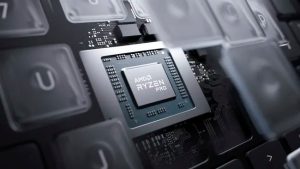AMD unveils new AI chips amid competition with Nvidia and Intel

AMD has announced its latest AI chips designed to optimize Copilot+ for enterprise users.
The news came at the chipmaker’s Advancing AI event on Thursday (Oct, 10). The Ryzen AI PRO 300 series is a new mobile chip series that will be the first processor series designed from the ground up for Copilot+ enterprise use.
AMD claims that the 300 series offers up to three times the AI performance than their previous generation of chips, describing the performance as “uncompromising” in a press release. The company also states the chip will offer “world-class security” with AI-based malware detection and Supply Chain Security for added traceability.
AMD states highest rated new chips offer up to 40% higher performance than the equivalent Intel chip, the Core Ultra 7 165U, along with 14% faster performance. They also claim that due to “innovative power management”, laptops using the new processors will have an “extended”, “multi-day” battery life.
“Enterprises are increasingly demanding more compute power and efficiency to drive their everyday tasks and most taxing workloads. We are excited to add the Ryzen AI PRO 300 Series, the most powerful AI processor built for business PCs10, to our portfolio of mobile processors,” said Jack Huynh, senior vice president and general manager of AMD’s Computing and Graphics Group. “Our third generation AI-enabled processors for business PCs deliver unprecedented AI processing capabilities with incredible battery life and seamless compatibility for the applications users depend on.”
Nvidia are dominant in the chip market with approximately 88% share of the GPU market compared to AMD’s 14% in 2023. The company’s Instinct MI300X GPUs performed better than anticipated and if these new chips can deliver on the promises made, they will surely make inroads into the laptop market too.
AMD Ryzen AI PRO 300 series comparisonAMD has released three different models in the PRO 300 series, all with different performances.
- AMD Ryzen
 AI 9 HX PRO 375 – 12 cores/24 threads – Up to 5.1GHz Boost/2GHz Base frequency – 36MB Total Cache – Radeon
AI 9 HX PRO 375 – 12 cores/24 threads – Up to 5.1GHz Boost/2GHz Base frequency – 36MB Total Cache – Radeon 890M Graphics – 15-54W cTDP – Up to 55 TOPS
890M Graphics – 15-54W cTDP – Up to 55 TOPS - AMD Ryzen
 AI 9 HX PRO 370 – 12 cores/24 threads – Up to 5.1GHz Boost/2GHz Base frequency – 36MB Total Cache – Radeon
AI 9 HX PRO 370 – 12 cores/24 threads – Up to 5.1GHz Boost/2GHz Base frequency – 36MB Total Cache – Radeon 890M Graphics – 15-54W cTDP – Up to 50 TOPS
890M Graphics – 15-54W cTDP – Up to 50 TOPS - AMD Ryzen
 AI 7 PRO 360 – 8 cores/16 threads – Up to 5GHz Boost/2GHz Base frequency – 24MB Total Cache – Radeon
AI 7 PRO 360 – 8 cores/16 threads – Up to 5GHz Boost/2GHz Base frequency – 24MB Total Cache – Radeon 880M Graphics – 15-54W cTDP – Up to 50 TOPS
880M Graphics – 15-54W cTDP – Up to 50 TOPS
Featured image credit: AMD
The post AMD unveils new AI chips amid competition with Nvidia and Intel appeared first on ReadWrite.
